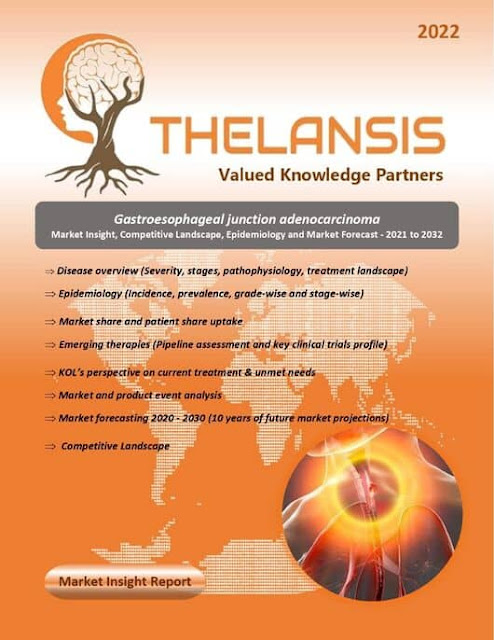Gastroesophageal Junction Adenocarcinoma – Market outlook, Epidemiology, Competitive Landscape, and Market Forecast Report – 2020 To 2030
Gastroesophageal junction adenocarcinoma is a carcinoma in which the epicenter of the tumor is located within the GEJ region and remains a significant clinical problem that increases the disease burden with a poor prognosis. Most patients present with advanced disease, and less than 50% undergo curative treatment. Tumor infiltration of the proximal or distal resection margin has diminished survival in most series. The Siewert classification is applied to adenocarcinomas located within 5 cm above or below the GEJ. The GEJ adenocarcinomas are classified into three types as follows. Type I, which is located 1–5 cm above the GEJ, is adenocarcinoma of the distal esophagus. Type II is true carcinoma of cardia centered between 1 cm above and 2 cm below the GEJ. Type III is subcardial carcinoma located 2–5 cm below the GEJ. Adenocarcinoma of the gastroesophageal junction (GEJ) remains a significant clinical problem increasing in incidence and is associated with a poor prognosis. Most patients present with advanced disease, and less than 50% undergo curative treatment.
The incidence of Gastroesophageal
junction adenocarcinoma ranges from 2.8 to 3.9 per 100,000 population in the
USA.
The competitive
landscape of Gastroesophageal Junction Adenocarcinoma includes country-specific
approved and pipeline therapies. Any asset/product-specific designation or
review and Accelerated Approval are tracked and supplemented with analyst
commentary.
KOLs insights of Gastroesophageal
Junction Adenocarcinoma across the 8 MM market from the center of Excellence/
Public/ Private hospitals participated in the study. Insights around current
treatment landscape, epidemiology, clinical characteristics, future treatment
paradigm, and Unmet needs.
Gastroesophageal
Junction Adenocarcinoma Market
Forecast: Patient Based Forecast Model (MS. Excel Based Automated
Dashboard), which Data Inputs with sourcing, Market Event, and Product Event,
Country specific Forecast Model, Market uptake and patient share uptake,
Attribute Analysis, Analog Analysis, Disease burden, and pricing scenario,
Summary, and Insights.
S. No Asset Company Stage
1 EP-104IAR Akeso Phase 3
2 DS-8201a Daiichi
Sankyo, Inc. Phase 2
3 Bemarituzumab Amgen Phase 3
4 MEDI4736 + tremelimumab MedImmune
LLC Phase 2
5 Avelumab EMD
Serono Research & Development Institute, Inc. Phase 3
6 Ramucirumab and Paclitaxel Eli
Lilly and Company Phase 2
7 Andecaliximab and Nivolumab Gilead
Sciences Phase 2
8 QL1604 Qilu
Pharmaceutical Co., Ltd. Phase 3
9 Atezolizumab and Trastuzumab Hoffmann-La Roche Phase 2
10 CS1001 CStone
Pharmaceuticals Phase 3
Continued

Comments
Post a Comment